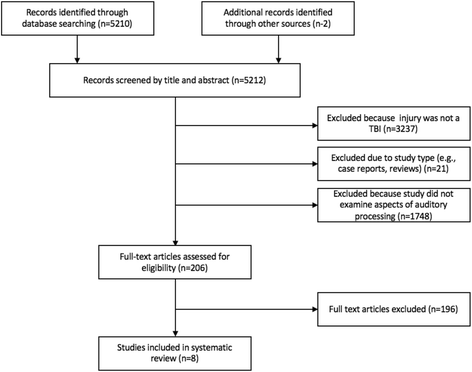Prosodic processing post traumatic brain injury - a systematic review
- PMID: 28077170
- PMCID: PMC5225621
- DOI: 10.1186/s13643-016-0385-3
Prosodic processing post traumatic brain injury - a systematic review
Abstract
Background: Traumatic brain injury (TBI) survivors often report difficulties with understanding and producing paralinguistic cues, as well as understanding and producing basic communication tasks. However, a large range of communicative deficits in this population cannot be adequately explained by linguistic impairment. The review examines prosodic processing performance post-TBI, its relationship with injury severity, brain injury localization, recovery and co-occurring psychiatric or mental health issues post-TBI METHODS: A systematic review using several databases including MEDLINE, EMBASE, Cochrane, LLBA (Linguistics and Language Behaviour Abstract) and Web of Science (January 1980 to May 2015), as well as a manual search of the cited references of the selected articles and the search cited features of PubMed was performed. The search was limited to comparative analyses between individuals who had a TBI and non-injured individuals (control). The review included studies assessing prosodic processing outcomes after TBI has been formally diagnosed. Articles that measured communication disorders, prosodic impairments, aphasia, and recognition of various aspects of prosody were included. Methods of summary included study characteristics, sample characteristics, demographics, auditory processing task, age at injury, brain localization of the injury, time elapsed since TBI, reports between TBI and mental health, socialization and employment difficulties. There were no limitations to the population size, age or gender. Results were reported according to the PRISMA guidelines. Two raters evaluated the quality of the articles in the search, extracted data using data abstraction forms and assessed the external and internal validity of the studies included using STROBE criteria. Agreement between the two raters was very high (Cohen's kappa = .89, P < 0.001). Results are reported according to the PRISMA guidelines.
Results: A systematic review of 5212 records between 1980 and 2015 revealed 206 potentially eligible studies and 8 case-control studies (3 perspective and 5 retrospective) met inclusion and exclusion criteria for content and quality. Performance on prosodic processing tasks was found to be impaired among all participants with a history of TBI (ages ranged from 8 to 70 years old), compared to those with no history of TBI, in all eight studies examined. Compared with controls, individuals with a history of TBI had statistically significantly slower reaction time in identifying emotions from prosody and impaired processing of prosodic information that is muffled, non-sense, competing, or in conflict (prosody versus semantics). Heterogeneous findings on correlations between specific brain locations and prosodic processing impairment were reported. Psychiatric issues, employment status or social integration post-TBI were scarcely reported but, when reported, they co-occurred with a history of TBI and prosodic impairments.
Conclusions: The current review confirms the relationship between impaired prosodic processing and history of TBI. Future studies should collect and report comprehensive details about severity of TBI, location of brain injury and time elapsed since injury, as they could key influence factors to the extent of prosodic processing impairments and recovery from auditory processing impairments post-TBI. The exploration of prosodic processing tasks as a possible neuropsychological marker of TBI diagnosis and recovery is warranted.
Keywords: Prosodic processing; Psychiatry; Recovery marker; Speech prosody; Traumatic brain injury.
References
-
- Canadian Institute for Health Information. Head injuries in Canada: a decade of change (1994–1995 to 2003–2004). CIHI. 2006. Accessed 3 July 2015 at: https://secure.cihi.ca/free_products/ntr_head_injuries_2006_e.pdf
-
- Faul M, Xu L, Wald MM, Coronado VG. Traumatic brain injury in the United States: emergency department visits, hospitalizations and deaths 2002–2006. Atlanta: Centers for Disease Control and Prevention, National Center for Injury Prevention and Control; 2010.
-
- Coronado VG, Basabaraju SV, McGuire LC, Wald MM, Faul MD, Guzman BR, et al. Surveillance for traumatic brain injury-related deaths—United States, 1997–2007. Surveill Summ. 2011;60(SS05):1–32. - PubMed
Publication types
MeSH terms
LinkOut - more resources
Full Text Sources
Other Literature Sources
Medical
Miscellaneous


